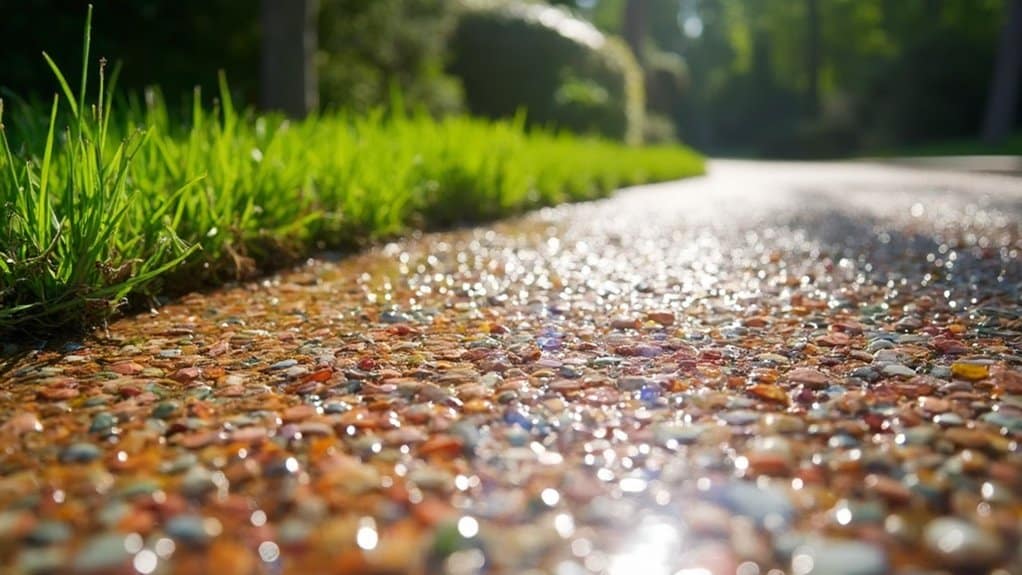Resin-bound gravel costs more than standard paving options for several key reasons. The materials themselves – UV-stable resin and top-grade stone aggregates – command higher prices than basic concrete or tarmac. Installation requires specialist expertise, much like fitting a bespoke kitchen, with thorough ground preparation and precise mixing ratios. Each project is unique, with colour and pattern choices affecting the final cost. Think of it as choosing between a basic patio and a tailored outdoor living space – you're paying for quality and craftsmanship. Whilst the upfront cost is steeper, many UK homeowners find the durability and low maintenance requirements worthwhile, particularly given our varied weather conditions.
Key Takeaways
Five Key Reasons Resin-Bound Gravel Costs More:
Quality Materials
Premium resins and specially graded aggregates make up the bulk of the cost – they're simply pricier than standard concrete or tarmac, but they deliver superior results.
Skilled Labour
You can't cut corners with installation. It takes proper training and experience to mix and lay resin surfaces correctly, which means higher labour costs than basic paving work.
Bespoke Options
Want a specific colour or pattern? Resin-bound surfaces offer loads of choice, but customisation naturally adds to the price tag.
Long-Term Value
While it costs more upfront, a properly installed resin surface lasts 20-25 years – that's much longer than cheaper alternatives like loose gravel or basic concrete.
Supply Costs
Getting materials to site can be dear, especially if you're not near major suppliers. The specialist nature of resin-bound materials means fewer local stockists, which affects pricing.
High-Quality Materials Used in Resin-Bound Gravel

High-quality materials are essential for resin-bound gravel projects across the UK. Premium aggregates, properly washed and kiln-dried, form a stronger bond with the resin and prevent unwanted dust or moisture issues. You'll spot these materials in everything from smart home driveways to commercial car parks, available in a range of colours to match any design scheme. The resin itself needs UV protection and scratch resistance – particularly important for our British weather. Think of it like choosing good paint for your garden fence; the better quality you use, the longer it lasts. While top-grade materials cost more upfront, they save money over time through less maintenance and repairs. They also meet SuDS requirements for water drainage, which is crucial for UK building regulations. Additionally, DALTEX Performance UVR Resin is now BBA approved, ensuring its quality and durability. Moreover, using UV-resistant resin not only enhances the longevity of the surface but also prevents fading, which is particularly beneficial in the variable UK climate. It's rather like buying good kitchen worktops – spend more now, benefit for years to come.
Labor Intensity and Professional Installation
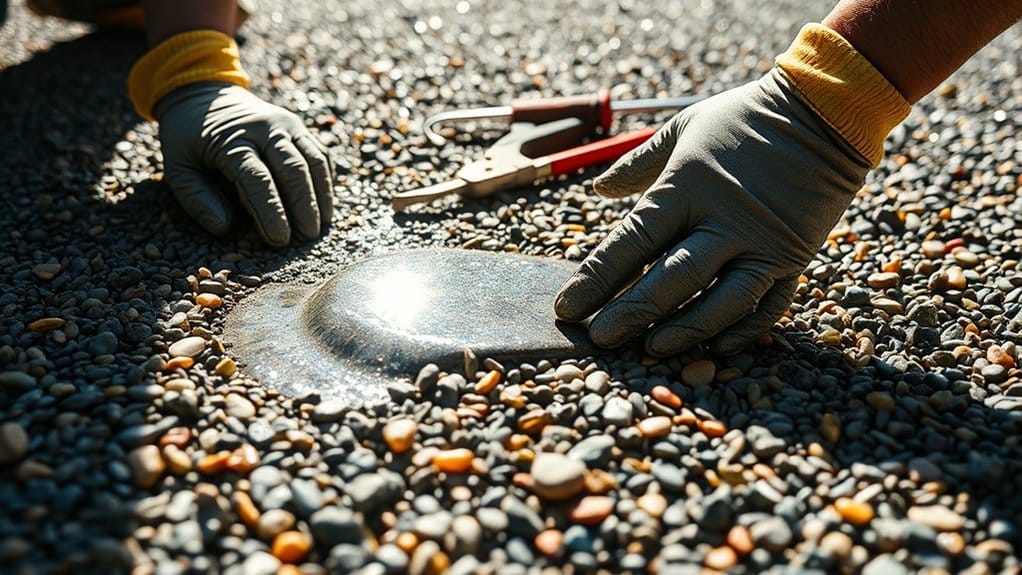
Labour intensity and professional installation significantly impact resin-bound gravel costs. The process requires skilled craftsmen who understand proper mixing ratios and base preparation techniques – much like a master baker needs precise measurements for consistent results. Additionally, the installation of resin-bound gravel requires a permeable surface to ensure effective water drainage, further complicating the process. Proper ground preparation is crucial to prevent structural issues later on, making expertise even more valuable.
Installing resin-bound gravel isn't a typical DIY job. Complex patterns, tricky access points and weather-dependent application all demand experienced hands. A professional team brings specialist tools and know-how, ensuring proper drainage and a long-lasting finish.
While professional installation costs more than DIY options, it's worth the investment. Certified installers offer warranties and quality guarantees, protecting your investment from common issues like loose stones or poor drainage.
Think of it like getting your boiler installed – you could try it yourself, but a qualified professional ensures it's done safely and correctly.
The labour-intensive nature of the work, from careful surface preparation to swift application before the resin sets, means higher costs. However, proper installation by trained professionals prevents expensive repairs down the line.
Customization Options and Their Impact on Cost
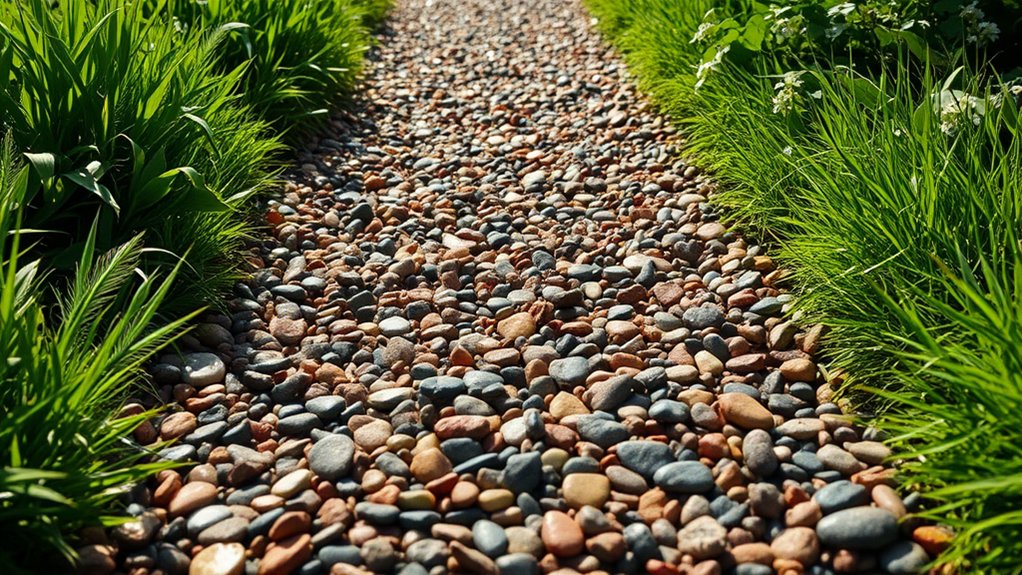
Professional fitting opens up numerous customisation choices that affect your resin-bound gravel costs. You'll find plenty of colours and stones to choose from – whether you fancy matching current garden trends or creating something unique for your property. Be mindful that premium materials like marble or quartz will bump up the price significantly. Additionally, the use of outdoor resin bound gravel's excellent resistance to frost and bad weather can further justify the investment. Moreover, selecting colors that complement your property's style can elevate both aesthetic appeal and overall value. Want a company logo or special pattern? These require extra skill and time, so they'll cost more. Special resins and stones also need careful handling and expert installation. Simply put, the fancier your design, the more you'll need to budget for a quality finish.
Area Preparation and Its Role in Pricing

Proper site preparation is vital for resin-bound gravel installation and significantly affects the final cost. Each preparation stage impacts your budget differently, from basic groundwork to finishing touches.
| Preparation Aspect | Cost Impact |
|---|---|
| Excavation Needs | Higher costs for labour and machinery |
| Depth Requirements | Affects material and labour costs |
| Site Cleanup | Critical for bonding, adds to price |
| Base Layer Material | Premium drainage options cost more |
| Compaction Work | Required to avoid future sinking |
Thorough ground preparation, whilst initially more expensive, protects your investment and ensures the surface lasts longer. The better the preparation, the more durable your resin-bound driveway or path will be.
Warranty and Quality Standards of Resin-Bound Gravel
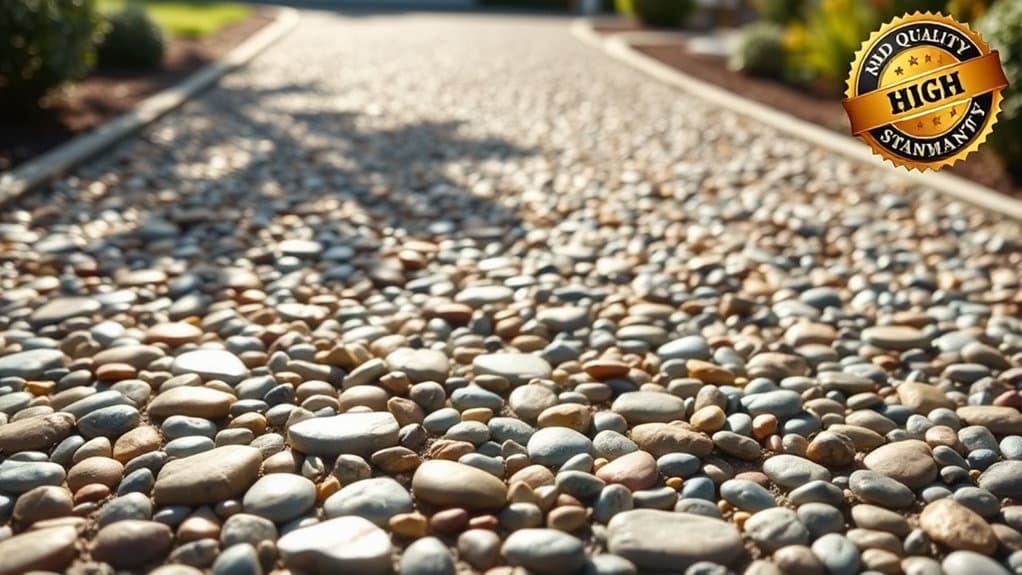
Quality resin-bound gravel installations in the UK typically come with specific warranty terms you'll want to check thoroughly.
Whilst manufacturers cover material defects, they won't usually pay for labour costs if things go wrong. Natural wear from British weather conditions – think frost damage or UV fading – often falls outside warranty protection.
To protect your investment, opt for BBA-approved products (British Board of Agrément) and hire installers who follow proper fitting standards.
A well-installed driveway from quality materials should last 15-20 years, but getting these basics right at the start is crucial.
Limited Warranty Terms
Understanding your resin-bound gravel warranty is crucial to protect your investment. Standard warranties run for ten years, but only activate once you've paid in full and met all contract conditions.
The warranty covers materials from your installer, but excludes damage from accidents or poor maintenance. Keep in mind that claims must be logged promptly – any delay could invalidate your rights.
These warranties don't transfer to new property owners, so it's essential to maintain proper records and understand how to file a claim.
Regular cleaning and basic upkeep, such as sweeping and occasional pressure washing, will help ensure your warranty remains valid.
Quality Assurance Standards
Quality Assurance Standards
A warranty's true value lies in its backing quality standards. Resin-bound gravel must meet strict performance requirements to ensure lasting quality:
- BBA Certification: Independently tested in labs and on-site
- Qualified Fitters: Installation by certified UK professionals
- Durability: UV-resistant resin and tested aggregates for British weather
- SUDS Compliance: Meets UK drainage requirements
- Load Bearing: Suitable for both foot traffic and vehicles
These standards justify the investment and ensure your surface remains reliable for years to come.
Cost Comparison With Other Paving Materials
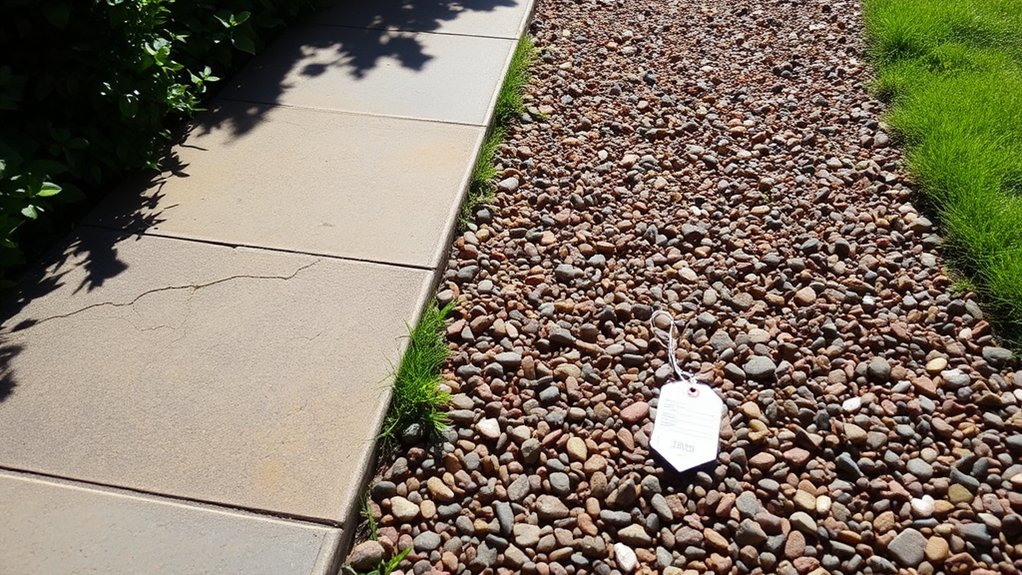
The initial cost of resin-bound paving typically runs higher than traditional gravel or block paving.
Whilst you might pay £50-£75 per square metre for block paving, resin-bound surfaces often start at £80-£100 per square metre.
However, when factoring in the minimal upkeep costs – no regular re-gravelling, fewer repairs and less frequent cleaning – resin-bound surfaces often prove more cost-effective over 10-15 years.
Unlike loose gravel that needs topping up yearly or block paving that may need re-laying, a well-installed resin surface maintains its appearance and functionality with basic sweeping and occasional pressure washing.
Pricing Overview by Material
Cost Breakdown: Resin-Bound Gravel vs Other Paving
Resin-bound gravel sits in the mid to premium price range of paving options, with costs reflecting both materials and specialist installation requirements.
Key pricing factors:
- Premium aggregates and UV-resistant resins drive material costs
- Skilled labour needed for proper installation
- Base preparation, including solid sub-base installation
- Design choices (stone colours and patterns affect pricing)
- Local market variations across UK regions
Material availability in your area impacts overall costs – sourcing from nearby suppliers typically reduces expenses. Local contractor competition and seasonal demand also influence final quotes.
Common price ranges (per m²):
- Basic mix: £60-80
- Mid-range options: £80-100
- Premium finishes: £100-120+
*Prices include standard installation on prepared surfaces
These figures help compare resin-bound systems with block paving, tarmac and concrete alternatives when planning your project.
Long-Term Value Considerations
The long-term value of resin-bound gravel makes it a sound investment for UK property owners.
Whilst initial costs exceed traditional paving options, these surfaces typically last 20-25 years – notably longer than tarmac or loose gravel's 15-year average lifespan.
The practical advantages are clear: minimal maintenance needs, strong resistance to British weather, and rare repairs.
Simply put, you'll spend less time and money on upkeep compared to conventional driveways.
Factor in fewer replacements over decades of use, and resin-bound surfaces prove remarkably cost-effective.
Beyond the financial benefits, they maintain their appearance well, boosting your property's kerb appeal and market value.
Installation Complexity and Expertise Required
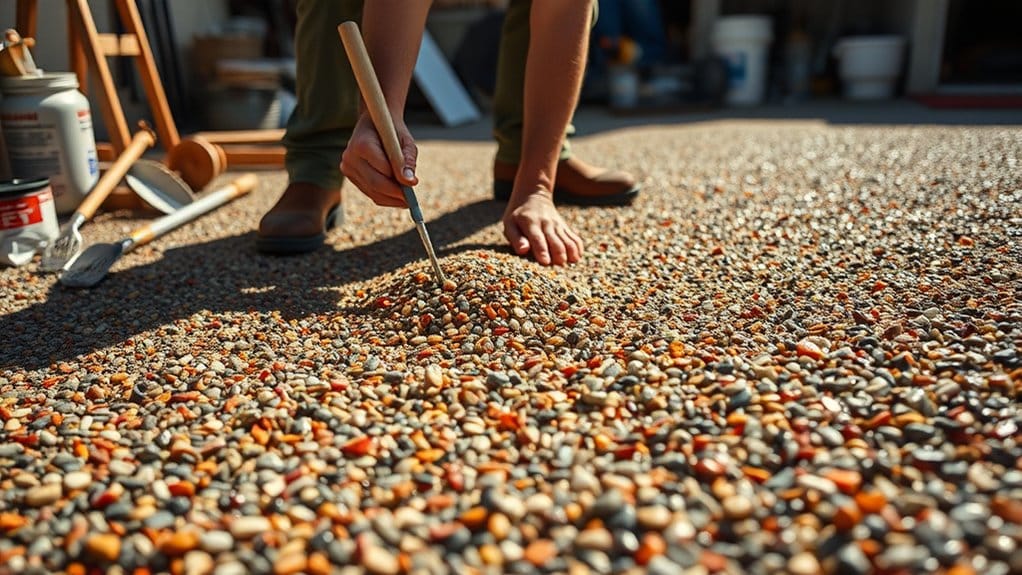
Installing Resin-Bound Gravel: Expertise Required
Resin-bound gravel installation isn't a typical DIY job – it's a complex process that needs proper expertise. Several key challenges make professional installation essential:
- Proper ground preparation, including digging and precise levelling
- Special mixing gear and application tools
- Quick working times – the resin must be laid whilst fresh
- British weather impact – rain and temperature affect installation
- Strict quality checks throughout the process
Think of it like laying a carpet – whilst it looks straightforward, getting professional results needs proper training and experience.
Whilst hiring qualified installers adds to the cost, it's crucial for ensuring your driveway or path lasts for years to come.
Most UK homeowners find that professional installation, though pricier, proves better value than risking a DIY approach that might need costly fixes later.
Customization and Aesthetic Appeal
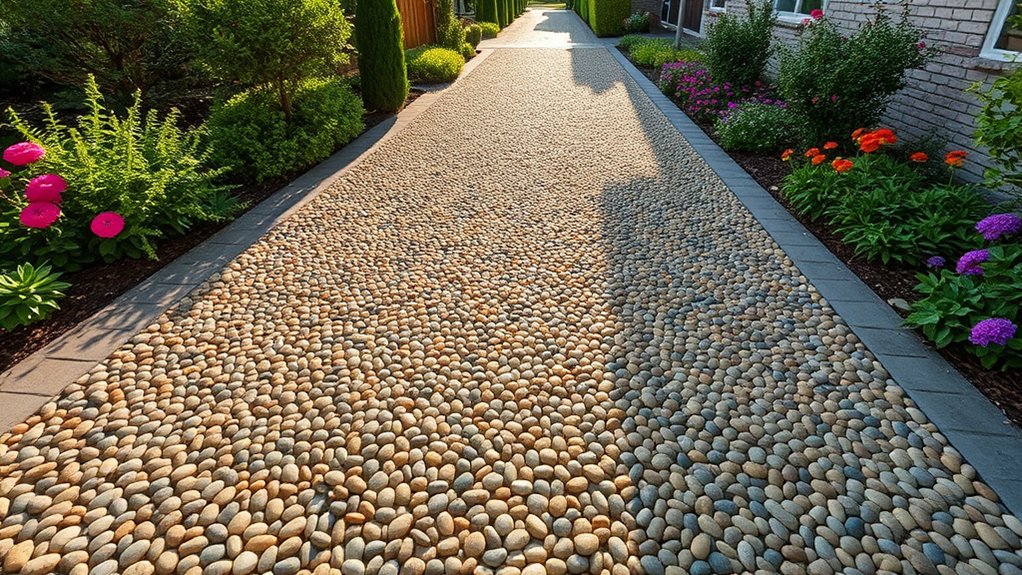
Resin-bound gravel offers brilliant customisation options to suit any property. The range of colours and textures available means you can match current trends or create timeless designs.
Think classic granite grey for a modern driveway or warm amber tones for a garden path. You can add borders, patterns and logos to make your space unique.
Mix different stones – perhaps combining local Cotswold aggregates with darker gravel for contrast. The flexible nature of resin means you're not limited to straight lines; curved edges and flowing shapes work beautifully.
The finished surface is both attractive and practical, with a smooth, non-slip finish that maintains its smart appearance throughout the British weather.
Whether for a front garden in Manchester or a seaside patio in Cornwall, resin-bound gravel delivers both style and substance.
Sustainability Considerations of Resin-Bound Gravel

Resin-bound gravel stands out as a practical eco-friendly choice for UK homeowners looking to balance kerb appeal with environmental impact. This paving solution delivers several green benefits through smart material use:
- Recycled materials: Uses reclaimed aggregates such as crushed glass from local waste, reducing landfill.
- Natural drainage: Acts like a sponge during British downpours, helping prevent localised flooding.
- Long-lasting surface: Typically lasts 15-20 years, meaning fewer replacements and less waste.
- Temperature control: Reflects heat better than tarmac or concrete, keeping garden spaces cooler.
- Low upkeep needs: Requires minimal cleaning and rarely needs repairs, reducing ongoing environmental costs.
Whilst the resin component isn't renewable, the system's overall environmental impact proves lower than traditional paving options.
It's a sensible choice for those wanting an attractive drive or path that treads lightly on the environment.
Market Trends and Availability Factors
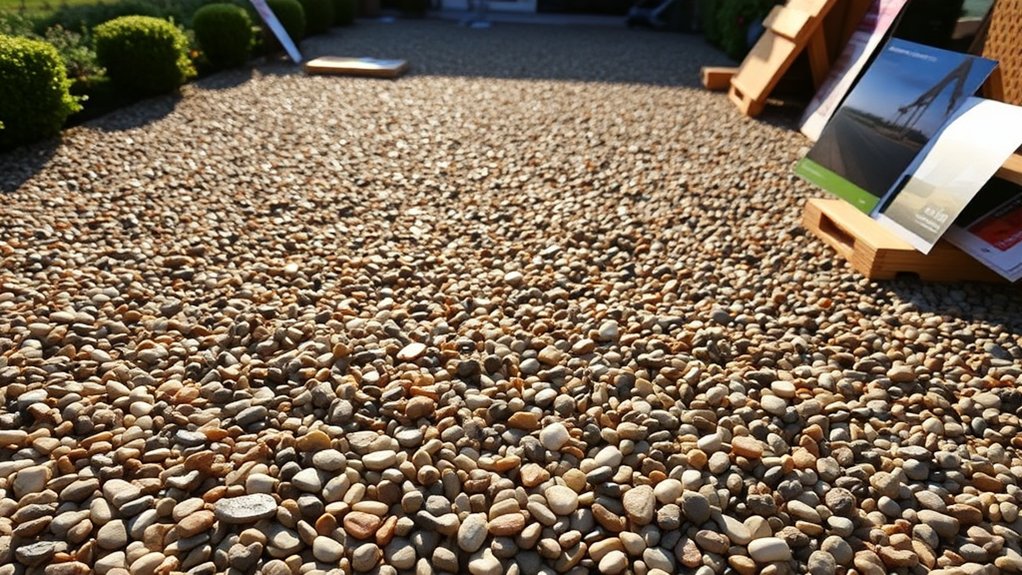
When looking at resin-bound gravel trends in the UK market, local contractor availability plays a crucial role in costs.
Growing popularity of these surfaces across British homes and businesses can lead to longer waiting times and higher prices, particularly during peak seasons like spring and summer.
Quality aggregates may be harder to source in some regions, especially if you're after specific colours or grades.
Worth checking multiple suppliers and booking well ahead to secure better rates and ensure your preferred materials are in stock.
Regional Contractor Availability
Regional Contractor Availability
The availability of local contractors directly affects the cost and accessibility of resin-bound gravel installations across the UK. Key factors include:
- Workforce makeup: The mix of experienced and newer contractors in your area
- Coverage zones: How far firms will travel from their base, affecting local prices
- Local competition: More contractors typically mean better rates, particularly in cities
- Location challenges: Rural areas often pay more, as fewer contractors serve these regions
- Busy periods: Summer usually sees higher demand and prices, whilst winter offers better rates
Understanding these patterns helps when planning your installation and budgeting.
For example, booking a driveway installation in Manchester might cost less than in the Yorkshire Dales, simply due to contractor numbers.
Similarly, scheduling work for autumn could save money compared to peak summer prices.
Increased Demand Impacts Pricing
Rising demand for resin-bound gravel driveways and paths is pushing prices upward across the UK market.
More homeowners are choosing these surfaces for their sustainability and visual appeal, which has led to higher costs industry-wide.
Though pricier than standard paving upfront, resin-bound surfaces typically save money over time through minimal upkeep and lasting durability.
Design complexity and material quality affect the final cost, with bespoke patterns commanding premium rates.
While supplier competition helps keep some prices in check, expect costs to remain firm, particularly during the busy spring and summer installation periods.
Material Sourcing Challenges
Material Sourcing: What Affects Resin-Bound Gravel Costs
Rising costs of resin-bound gravel stem from several key sourcing challenges that impact British suppliers and contractors:
- Resin quality matters: Standard UV-resistant resin starts at £30 per m², whilst premium grades cost upwards of £45 per m².
- Local vs imported stone: British aggregates like Derbyshire spar cost less than Mediterranean marble chips.
- Special finishes cost more: Rare aggregates, such as crushed glass or coloured quartz, typically add 20-30% to material costs.
- Transport costs add up: Scottish suppliers face higher delivery charges than those near Southern ports.
- Market fluctuations: Brexit and global supply issues have made pricing less predictable since 2020.
When choosing materials for your driveway or patio, weigh these factors carefully.
A standard buff-coloured local aggregate might serve just as well as costly imported stone, whilst saving thousands on larger projects.
Regional Availability and Installation Limitations
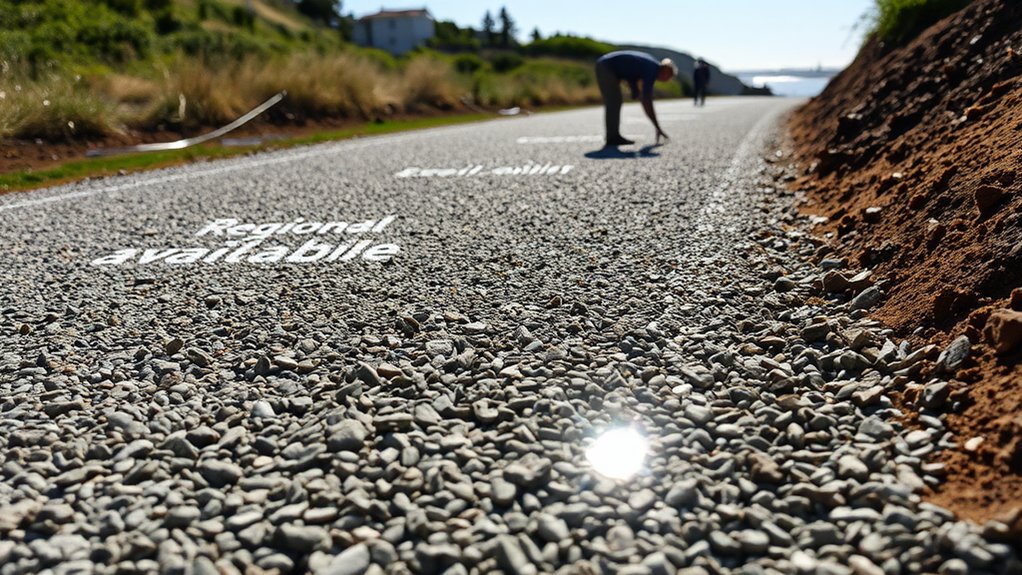
Regional factors greatly influence the availability and installation of resin-bound gravel across the UK. Limited local suppliers often mean higher costs, particularly in areas outside major cities where transport fees add up.
Labour costs vary significantly between regions – finding skilled installers in rural areas can be tricky and more expensive.
Installation challenges differ across Britain's diverse landscape. Steep driveways in Cornwall or restricted access in London's terraced streets pose unique difficulties. Weather plays a crucial role too – Scotland's longer winters and Wales' high rainfall can restrict suitable installation days.
For example, a project in central Manchester might cost less and offer more supplier options compared to one in the Scottish Highlands, where materials need to travel further and skilled installers are scarce. Understanding these regional differences helps plan both timing and budget effectively.
Understanding your local market is vital – check nearby suppliers, get multiple quotes, and plan around your area's typical weather patterns to avoid costly delays.
Frequently Asked Questions
How Long Does Resin-Bound Gravel Typically Last?
A properly installed resin-bound gravel surface lasts between 20 and 30 years, handily outlasting loose gravel and traditional tarmac driveways. Think of it as a once-in-a-generation investment for your property. Whilst the initial cost might be higher than alternatives, its impressive longevity and minimal maintenance needs make it a practical choice for British homeowners.
Can Resin-Bound Gravel Be Repaired if Damaged?
Resin-bound gravel can indeed be repaired when damaged. Much like fixing a crack in your garden patio, repairs involve assessing the damage first, then choosing the appropriate solution. Small areas can be patched up, whilst larger damage might need resealing or complete resurfacing to restore the surface properly.
Is Resin-Bound Gravel Suitable for Heavy Vehicle Traffic?
Resin-bound gravel can handle heavy vehicle traffic when properly installed. A solid base layer and correct resin mixture are essential – much like building a proper foundation for a house. The surface holds up well under lorries, waste collection vehicles and frequent car movements, though it's vital to ensure professional installation to prevent cracking or loose stones. Regular domestic driveways typically need a depth of 18mm, whilst areas with heavier traffic require at least 24mm thickness.
What Maintenance Is Required for Resin-Bound Gravel Surfaces?
Regular sweeping with a stiff brush keeps the surface free from leaves and debris, whilst annual pressure washing at a moderate setting maintains its appearance. Clean up oil and fuel spills straight away using a specialist cleaner to prevent staining. These simple steps help your resin-bound gravel stay smart and durable for years to come.
Are There Eco-Friendly Resin Options Available for Installation?
Yes, environmentally-friendly resin options are readily available in the UK market. These surfaces feature sustainable materials like recycled glass and natural aggregates, whilst offering proper drainage to reduce water runoff. They're particularly suited for driveways and garden paths where you need both durability and eco-conscious materials. The permeable nature helps comply with British planning regulations for sustainable drainage systems (SuDS).
Conclusion
In short, resin-bound gravel's higher cost reflects its long-term value. Consider the combined benefits: a smooth, low-maintenance surface that keeps its looks whilst providing reliable drainage and durability. Unlike cheaper alternatives, it won't crack, fade or need regular repairs. Properly installed by qualified professionals using quality materials, it's an investment that enhances your property's kerb appeal and functionality for years to come.
